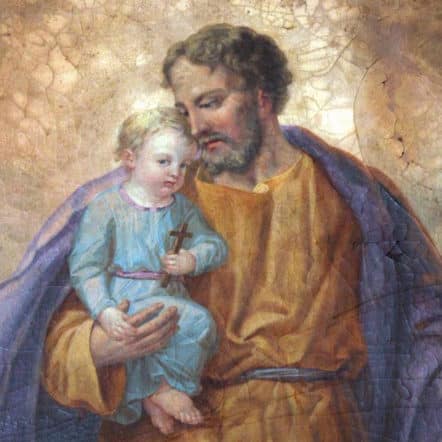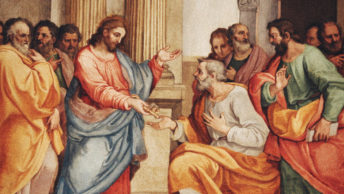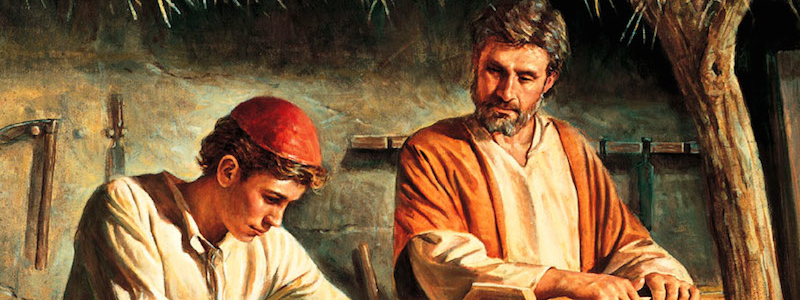According to legend, a holy married couple in Nazareth, who had been childless for many years, was blessed with a son—and they were informed in a dream that the boy’s name was to be Joseph. They carefully raised their child in their Jewish faith, and soon discovered he was always peaceful in spirit, had a deep love for God, and a special concern for dying persons; in fact, the boy’s prayers on behalf of the dying were very powerful, and every sinner for whom little Joseph prayed was saved. He loved praying, and especially going with his parents up to the Temple in Jerusalem each year. Joseph was eighteen when his parents died, and having no family ties to hold him in Nazareth, he gave away his small inheritance, moved to Jerusalem to be near the Temple, and became an apprentice to a carpenter for several years. Finally becoming a full-fledged carpenter himself, Joseph rented a small workshop near the Temple. He never charged customers for his work, but let them decide how much to pay him; he kept only the bare minimum of his earnings for himself, and gave away the rest of his income to the poor.
One night Joseph was informed in a dream that among the young women living in the Temple and being trained for the service of God was a holy maiden named Mary, who was especially dear to the Lord. Joseph began praying for her every day. Mary herself was informed by an angel of Joseph’s existence, and that he was praying for her; she in turn began praying for him—though neither yet knew they were destined to be married to each other. Joseph underwent a long period of spiritual dryness, during which he was fiercely assaulted by the devil. His shop was vandalized, he was the victim of gossip and false accusations, and there was even a misguided attempt find a wife for him. Through it all, Joseph bore every hardship with patience and trust, and as a result, grew steadily in grace. At the age of thirty, Joseph heard that all unmarried men of the house of David were to assemble at the Temple, so that a husband might be chosen for Mary, who was then age fourteen. Joseph obeyed, but in his humility took a place behind the others, hoping to remain out of sight. As part of a traditional ritual, all the men were given dried branches to hold—and when Joseph’s branch suddenly brought forth snow-white blossoms, even as a white dove suddenly appeared and rested on Joseph’s head, the high priest Simeon solemnly declared that God had revealed His choice. Mary, who by then had realized Joseph was to be her husband, was overjoyed at this news; Joseph himself was filled with joy, yet profoundly aware of his unworthiness of such a great honor.
During the simple wedding ceremony that followed, the bride and groom saw a small flame coming forth from each of their hearts, merge into one, and ascend up to Heaven. They spent their wedding night praying and discussing the things of God; they decided to return to Nazareth and live in a small home that had belonged to Mary’s family. Some time later, when Mary mentioned her desire to visit her cousin Elizabeth, Joseph happily escorted her back down to Judea, and allowed her to remain until after the birth of John the Baptist, while he returned to Nazareth to resume his work. When he came to escort Mary back to Nazareth several months later, it was obvious she was with child. Joseph was filled with the greatest distress, not knowing what to think; he tried to lose himself in his work, but was overwhelmed with confusion and grief. Many times he intended to question Mary, but found himself unable to do so. Mary herself knew what he was going through, but felt it wasn’t her place to say anything, so she prayed for him, while waiting for God to make known His plan to her husband. Joseph kept agonizing over the question: had Mary been unfaithful to him? He knew that was impossible—but what other explanation was there? He wanted to be faithful to God’s Law, and also merciful to Mary—so what was he to do? (With Mary to Jesus, pp. 29ff). As the Gospel of Matthew (1:18-24) describes, he decided to divorce her quietly—and it was only then that, during a dream, God’s angel finally revealed the truth about Mary’s pregnancy. Upon awakening, Joseph immediately trusted in the message he was given and obeyed God’s plan for him wholeheartedly—and this is the example of greatness each one of us is called to imitate.
Our lives are nothing like that of St. Joseph—but we can choose to imitate his virtues, with the help of God’s grace. Like him, we are called to have a special concern for the dying, praying for their eternal salvation, for this can be a profoundly powerful work of mercy. Like Joseph, we can be generous to others in need, even if our circumstances require us to give only small amounts; this is very pleasing to God. Like Joseph, we can try to bear our crosses patiently, reminding ourselves that God can use our trials and sufferings to help us make great spiritual progress. Like Joseph, who prayed for Mary, we can pray for all those who have a special calling from God, for in this way we cooperate in a wonderful manner with Divine Grace. Like Joseph, we can strive to be humble, for this allows God to be glorified through us. Like Joseph, we can trust that God does have a plan, for this will help us through times of difficulty and confusion and doubt. And like Joseph, we can obey as soon as the Lord’s will is revealed to us—for in this way we will play our role in God’s holy and mysterious plan of salvation. In these last days of Advent, let us give thanks for the example of St. Joseph, and thus prepare ourselves for a worthy celebration of the true meaning of Christmas.








